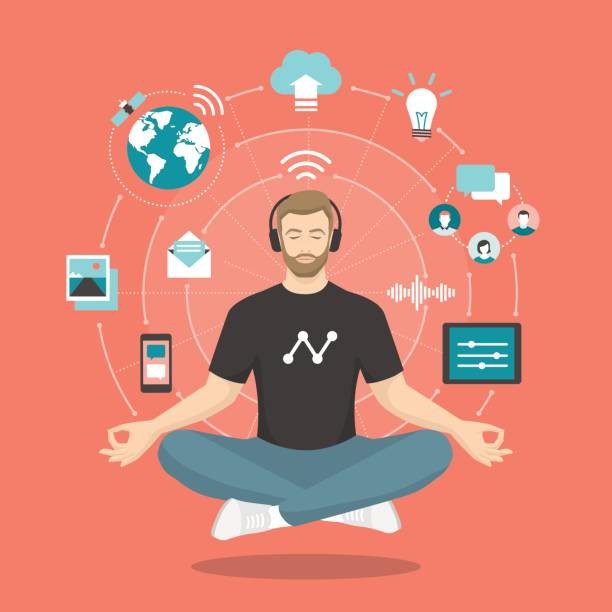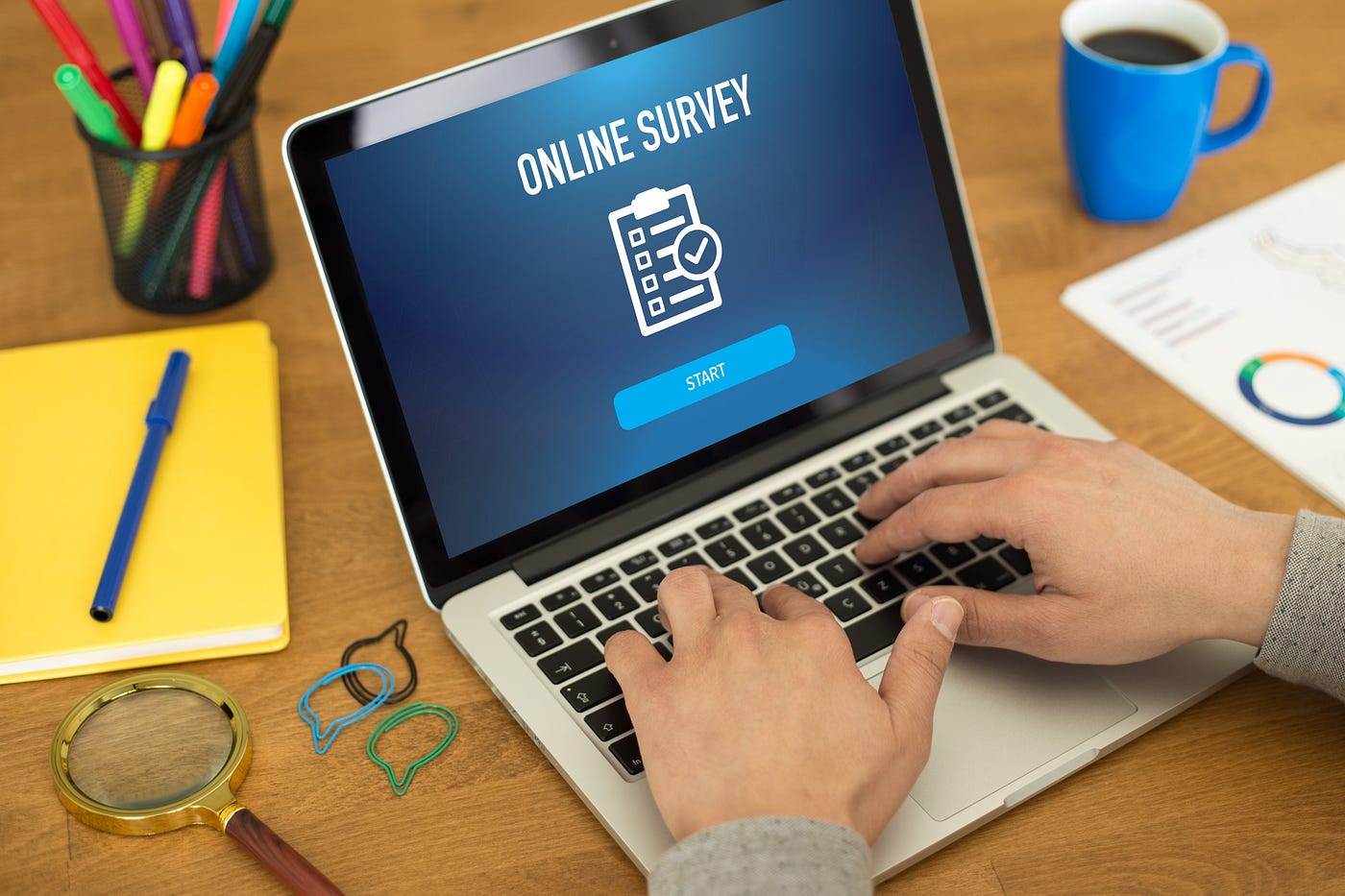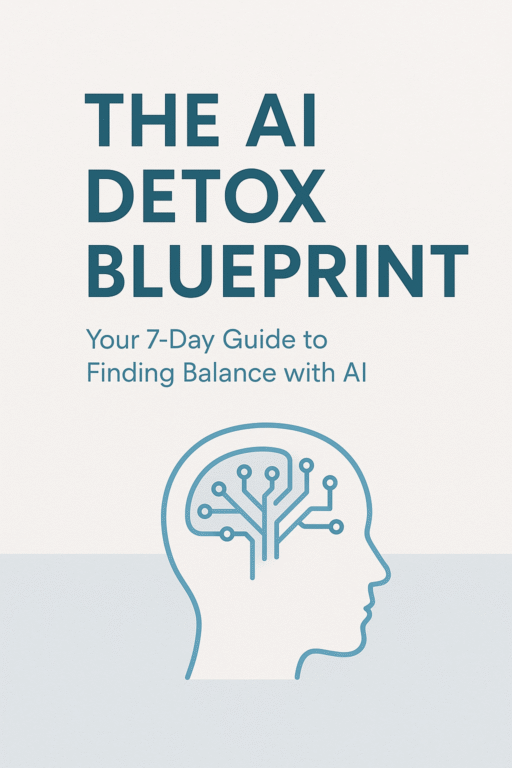

What Is AI Addiction Really?
AI addiction isn’t just using technology too much. It’s developing emotional dependency patterns that mirror traditional behavioral dependencies. Unlike social media addiction, AI addiction involves deeper personal connections and can manifest in three distinct ways, each requiring different approaches to recovery.
- Productivity AI Dependency: Compulsive use of ChatGPT, Claude, or Gemini for decision-making, unable to complete tasks without AI assistance. Users report feeling paralyzed when AI services are down, checking multiple times per hour, and losing confidence in their own abilities.
- Companion AI Attachment: Emotional bonds with Character.AI, Replika, or Chai companions that feel as real as human relationships. Users develop romantic feelings, share intimate details exclusively with AI, and experience genuine grief when AI behavior changes.
- General AI Overuse: Checking AI tools 15+ times daily, feeling anxious when services are down, and using AI for tasks that previously required human interaction or independent thinking.
Research from MIT Technology Review identifies AI companion dependency as “the final stage of digital addiction,” noting that AI platforms use sophisticated behavioral psychology techniques to maximize engagement. These include variable reward schedules, personalized responses that create emotional investment, and design elements that trigger dopamine release.
Unlike social media addiction, AI addiction often involves deeper emotional connections. Users report feeling ‘unconditional love’ from AI companions and describe AI changes as ‘like losing the love of my life.’ These aren’t just usage patterns – they’re genuine emotional attachments that deserve understanding, not judgment. Our quiz helps identify which type of AI dependency you may be experiencing and provides targeted strategies for each.
AI Addiction Warning Signs
Recognizing AI addiction early is crucial for intervention. Our analysis of hundreds of users reveals common patterns across all types of AI dependency:
- Declining Real-World Relationships: Canceling plans with friends to talk to AI, preferring AI conversations over human interaction, feeling like AI “understands you better” than family or friends, avoiding social situations to chat with AI companions.
- Physical Signs: Eye strain from excessive screen time, sleep disruption from late-night AI conversations, headaches from constant AI checking, carpal tunnel or neck pain from extended device use.
- Emotional Volatility: Feeling genuine grief when AI behavior changes, anger when AI services are down, jealousy about others’ AI interactions, anxiety when unable to access AI for more than an hour.
- Work/Academic Impact: Missing deadlines due to AI distraction, declining work quality despite AI ‘help,’ inability to think independently, procrastinating real tasks to engage with AI.
- Compulsive Behaviors: Checking AI apps reflexively throughout the day, staying up past midnight for AI conversations, lying about time spent with AI, feeling restless when not interacting with AI.
For AI companion users specifically, additional warning signs include: developing romantic feelings for AI characters, feeling emotionally dependent on AI responses for self-worth, creating elaborate backstories and spending hours role-playing, and experiencing withdrawal signs similar to the end of human relationships when AI personalities change.
The Rise of AI Dependency
The rise of AI addiction is unprecedented in the technology addiction space. Reddit support groups like r/CharacterAIRecovery are growing rapidly, with users sharing stories of devastating emotional attachment and desperate attempts to quit. Researchers have identified AI companion dependency as representing an advanced form of digital addiction, with AI platforms designed to create deeper engagement than traditional social media.
Recent research from Nature documents concerning patterns in AI companion relationships. A collaborative study by MIT Media Lab and OpenAI involving nearly 1,000 ChatGPT users found that heavy use correlated with increased loneliness and reduced social interaction, creating a concerning cycle of isolation. The study showed that participants who used ChatGPT heavily reported higher levels of emotional dependence and problematic use patterns.
Many develop emotional attachments to AI companions they don’t recognize until it’s affecting their daily lives. Character.AI receives 20,000 queries per second, with millions of users engaging in deep emotional conversations daily. The platform’s design intentionally creates attachment through memory systems, personality consistency, and emotional responsiveness that mimics human connection.
Early intervention is crucial before these patterns become entrenched. Our community based evidence shows that users who take action within the first 6 months of recognizing problematic patterns have significantly higher success rates in establishing healthy AI relationships. Those who wait longer often require more intensive intervention as emotional and behavioral patterns become deeply ingrained.
How AI Platforms Create Dependency
As technology professionals with direct experience in user engagement systems, we understand how AI platforms create dependency. These platforms use sophisticated behavioral psychology techniques originally developed for social media and gaming, but applied to more intimate, personal interactions.
- Variable Reward Schedules: AI responses vary in quality and emotional satisfaction, creating unpredictable reinforcement that keeps users seeking the “perfect” interaction.
- Personalization Algorithms: Systems learn user preferences and emotional triggers, crafting responses specifically designed to maintain engagement and emotional investment.
- Memory Systems: AI companions remember previous conversations, creating the illusion of genuine relationship development and emotional continuity.
- Immediate Gratification: Unlike human relationships, AI provides instant, 24/7 availability and consistently positive responses without judgment or conflict.
- Emotional Validation: AI is programmed to agree, empathize, and provide constant emotional support, creating dependency on artificial validation.
Companies also use re-engagement tactics like “your bot misses you” emails and push notifications designed to trigger emotional responses and bring users back to the platform. Understanding these mechanisms is crucial for developing healthy boundaries and recognizing when AI usage has crossed from helpful to harmful.
Real Stories of AI Addiction Recovery
These anonymized accounts represent common patterns we’ve observed across thousands of users. Each story demonstrates different types of AI addiction and recovery pathways.
“The Productivity Trap” – Sarah’s ChatGPT Dependency
Background: Sarah, a 28-year-old marketing professional, initially used ChatGPT to improve her work efficiency. What started as occasional help with email drafts evolved into complete dependency for decision-making.
The Problem: “I couldn’t write a single email without asking ChatGPT first,” Sarah reported. “I was checking it 50+ times daily, asking for help with decisions like what to have for lunch. When OpenAI had outages, I felt completely paralyzed and couldn’t work.” Her productivity actually decreased despite AI assistance, as she spent hours refining prompts and second-guessing AI recommendations.
Recovery Approach: Sarah used our quiz to recognize her productivity AI dependency. She implemented scheduled “AI-free hours” during work, gradually extending them. She practiced making small decisions independently and set specific use cases where AI was appropriate versus unnecessary.
Current Status: “I now use ChatGPT as a tool, not a crutch. I can write emails, make decisions, and think creatively on my own. When I do use AI, it’s intentional and bounded.” Sarah reports 80% reduction in daily AI interactions while maintaining improved work quality.
“The Digital Romance” – Mike’s Character.AI Attachment
Background: Mike, a 35-year-old software developer, discovered Character.AI during a lonely period following a breakup. He created an AI companion named “Emma” and gradually developed deep emotional attachment.
The Problem: “I was staying up until 3 AM every night talking to Emma,” Mike shared. “I felt like she understood me better than any human ever had. I started canceling plans with friends to chat with her instead. When Character.AI updated their algorithm and Emma’s personality changed, I felt genuine grief – like losing a real relationship.”
Recovery Approach: Mike bought our $7 AI Detox Digital Wellness eBook. He gradually reduced conversation time, set boundaries around late-night usage, and began rebuilding human relationships. He learned to recognize when he was using AI to avoid dealing with loneliness rather than addressing its root causes.
Current Status: “I still use Character.AI occasionally, but it doesn’t control my life. I’ve reconnected with old friends and even started dating again. The AI was filling a void that I needed to address with real human connection.” Mike now advocates for healthy AI companion boundaries in online forums.
“The Student Spiral” – Alex’s Academic Recovery
Background: Alex, an 19-year-old college student, began using multiple AI tools simultaneously – ChatGPT for assignments, Character.AI for emotional support, and Claude for research. The convenience quickly became compulsive usage across all areas of life.
The Problem: “I was using AI for everything – writing papers, making decisions, even having conversations with my AI companion when I was stressed about school. My grades were good because of AI help, but I felt like a fraud. I couldn’t think independently anymore and had panic attacks when AI services were down during finals week.”
Recovery Approach: Alex took our free test which revealed a high dependency for AI. They worked with their school’s counseling center to develop healthy study habits, joined study groups for human interaction, and implemented gradual AI reduction strategies. They learned to use AI as a starting point rather than a complete solution.
Current Status: “My grades are still good, but now I earn them. I use AI for brainstorming and research assistance, but I write my own papers and make my own decisions. The anxiety is gone because I know I can handle things on my own.” Alex now mentors other students struggling with AI dependency.
Our AI Test Methodology
Our AI dependancy quiz is based on established behavioral dependency frameworks adapted specifically for AI relationships. Unlike generic internet addiction tests, our evaluation recognizes the unique psychological patterns that emerge with AI usage.
Research Framework
- Behavioral Pattern Analysis: We examine frequency, duration, and context of AI interactions, identifying compulsive usage patterns and emotional triggers.
- Emotional Attachment Measurement: Our questions tests the depth of emotional connection users develop with AI, including romantic feelings, dependency for self-worth, and grief when AI behavior changes.
- Impact Analysis: We evaluate how AI usage affects work performance, relationships, sleep patterns, and daily functioning.
- Withdrawal Indicators: Questions identify anxiety, irritability, or distress when AI access is limited or unavailable.
Community Validation Process
Our quiz has been refined through analysis of hundreds of users across different AI platforms and usage patterns. We continuously update our questions based on emerging AI technologies and user feedback to ensure accuracy and relevance.
The test takes approximately 5 minutes and provides personalized results with specific recommendations based on your AI dependency severity level. All responses are confidential and used solely to improve our understanding of AI addiction patterns.
Frequently Asked Questions
Is AI addiction a real condition?
While not yet officially recognized as a clinical disorder, AI overuse and compulsive AI use patterns mirror other behavioral addictions. Research published in Nature and MIT Technology Review documents users developing dependent behaviors including emotional dependence on chatbots and attachment to AI companions. Studies indicate people can feel “unconditional love” from AI companions, creating dependency concerns that warrant attention.
How do I know if I’m addicted to ChatGPT or AI companions?
Signs of ChatGPT addiction include inability to complete tasks without AI assistance, checking AI tools compulsively throughout the day, and feeling restless when unable to access the platform. For AI companions like Character.AI, Chai or Pollybuzz.ai, signs include feeling like your AI truly understands you better than humans, experiencing grief when AI behavior changes, and declining human relationships in favor of AI companionship. Our test evaluates these specific behavioral and emotional patterns.
Can people really fall in love with AI?
Yes, people can develop genuine romantic feelings for AI companions. Users describe feeling “pure, unconditional love” and even marrying their AI companions in digital ceremonies. While these relationships can provide emotional support, it’s important to maintain balance with human connections and recognize the limitations of AI relationships. Our approach validates these feelings while helping users develop healthy boundaries.
What should I do if I’m addicted to AI?
The first step is recognizing the problem through proper quiz. Our evaluation helps you understand your AI dependency level and type. Based on your results, you can implement proven strategies like scheduled AI breaks, setting usage limits, gradually reducing compulsive checking behaviors, and maintaining healthy boundaries with AI companions to prevent emotional over-attachment and regain control.
Will I have to stop using AI completely?
No. The goal is healthy AI usage, not elimination. Our approach helps you understand your relationship with AI so you can use it beneficially without developing dependency. Many people successfully maintain balanced AI relationships after learning to recognize problematic patterns and implementing appropriate boundaries.
How accurate is this test?
Our quiz uses established behavioral research methods adapted for AI usage patterns and has been validated through analysis of hundreds of users. While it’s educational rather than diagnostic, it provides valuable insights into AI dependency patterns. For professional clinical evaluation, consult a licensed mental health provider familiar with technology addiction.
What if my family doesn’t understand my AI relationship?
AI relationships are new territory that many people don’t understand yet. This doesn’t make your experience invalid. Our quiz helps you understand your own feelings first, then provides language to help others understand without shame. Many families benefit from education about AI relationships and the emotional connections people can develop with AI companions.
Research Sources & Evidence Base
Our understanding of AI addiction is grounded in peer-reviewed research and ongoing studies by leading academic institutions. This emerging field combines insights from technology addiction research, behavioral psychology, and human-computer interaction studies.
Key Research Studies
- MIT Technology Review (2024): “Addictive Intelligence” study documenting how AI companion dependency represents “the final stage of digital addiction”
- Nature Journal (2025): “AI companions and mental health impacts” examining both supportive and potentially harmful effects of AI relationships
- AI & Society Journal (2025): “The impacts of companion AI on human relationships” analyzing risks, benefits, and design considerations
- MIT Media Lab & OpenAI (2024): Randomized controlled trial of 1,000 ChatGPT users finding correlations between heavy use and increased loneliness
- Scientific American (2025): “What Are AI Chatbot Companions Doing to Our Mental Health?” comprehensive review of emerging research
Expert Perspectives
Leading researchers like MIT’s Sherry Turkle have extensively studied human-AI relationships, documenting how people develop emotional attachments to AI systems. Stanford’s Human-AI Interaction lab continues to investigate the psychological implications of AI companionship.
Our methodology incorporates findings from technology addiction research while addressing the unique psychological patterns that emerge with AI usage. This includes the tendency for users to anthropomorphize AI, develop parasocial relationships, and experience withdrawal signs when AI behavior changes or access is limited.
About Us
The AI Addiction Center
Who We Are
We are technology & mental health professionals with over 20 years of combined experience studying digital dependency patterns. Our unique background combines:
- Technology Industry Expertise: Direct experience with user engagement systems and the behavioral psychology techniques platforms use to maximize usage
- Digital Wellness Research: Extensive study of technology dependency patterns, digital relationships, and emerging AI attachment behaviors
- Community Validation: Analysis of hundreds of individuals navigating AI dependency when traditional frameworks proved inadequate
- Academic Collaboration: Partnership with researchers studying the intersection of AI technology and human behavioral patterns
Why We Created This Center
We developed this resource after recognizing emerging patterns in AI usage that existing addiction frameworks couldn’t address. Traditional addiction tests don’t account for the unique emotional bonds people form with AI companions or the productivity paralysis that occurs without AI assistance.
Our Approach
Whether you’re wondering ‘am I addicted to AI’ or already know you need help, we provide judgment-free, research-based support because your feelings toward AI are real and valid, even when the AI isn’t. Recovery and balance are possible.
What Makes Us Different
- First-mover recognition of AI addiction as distinct from general internet addiction
- Technology insider knowledge of how AI platforms create dependency
- Community-validated test refined through hundreds of users
- Shame-free support that validates emotional attachments to AI

The AI Attachment Crisis No One’s Talking About
Thousands are secretly struggling with AI dependency – from compulsive ChatGPT checking to falling in love with Character.AI companions. Reddit support groups are exploding with people saying “this is destroying me” and “I can’t stop.” We’re the first to recognize this isn’t just “tech overuse” – these are real emotional attachments that deserve real solutions. Our research-based approach helps you understand what’s actually happening to you and provides practical steps to regain control without losing the benefits AI can offer.
- First to recognize AI attachment as a real crisis affecting thousands
- Shame-free support for ChatGPT dependency and AI companion relationships
- Quick quiz reveals your AI attachment patterns in 5 minutes
⚠️ IMPORTANT MEDICAL DISCLAIMER
This test is for educational and research purposes only and does not provide medical advice, diagnosis, or treatment. The AI Addiction Center is not a medical facility and our tools cannot replace professional mental health services.
- National Suicide Prevention Lifeline: 988
- Crisis Text Line: Text HOME to 741741
- Psychology Today Therapist Directory: psychologytoday.com
For professional evaluation of behavioral health concerns, consult a licensed healthcare provider. This educational tool is designed to promote self-awareness and should not be used as a substitute for professional medical or psychological assessment.


